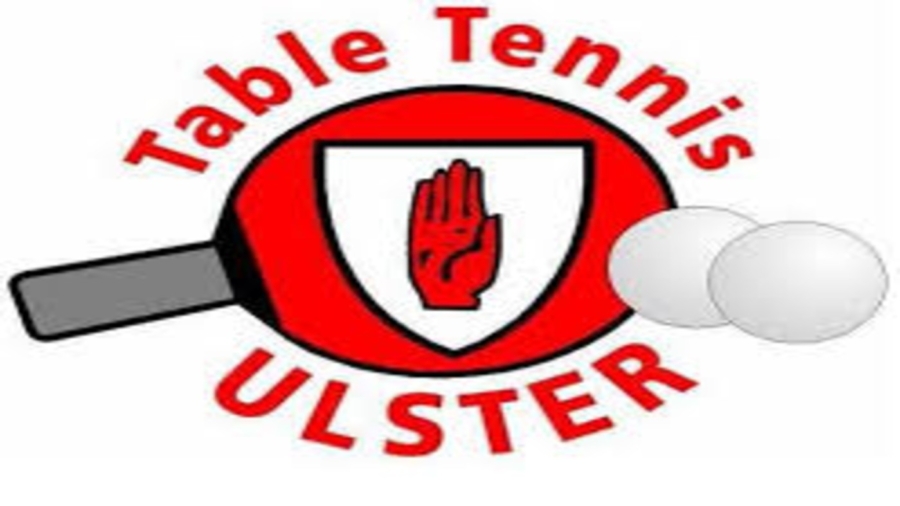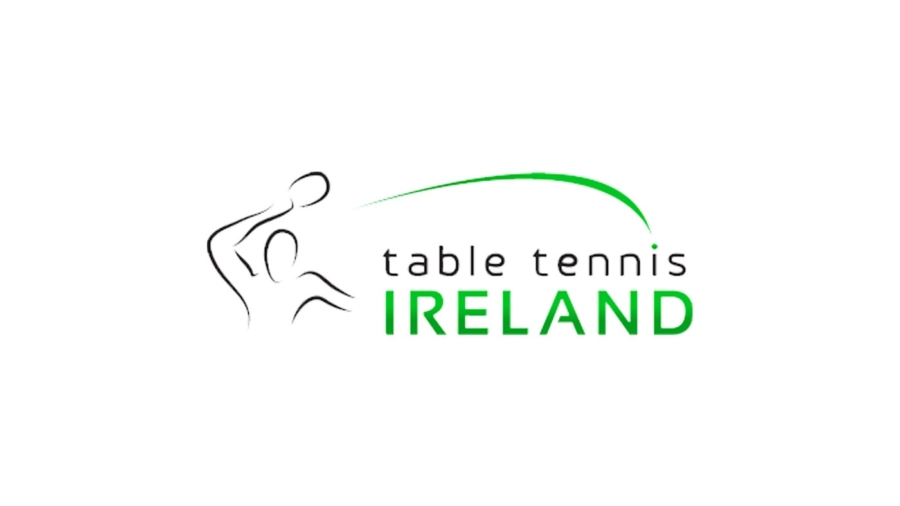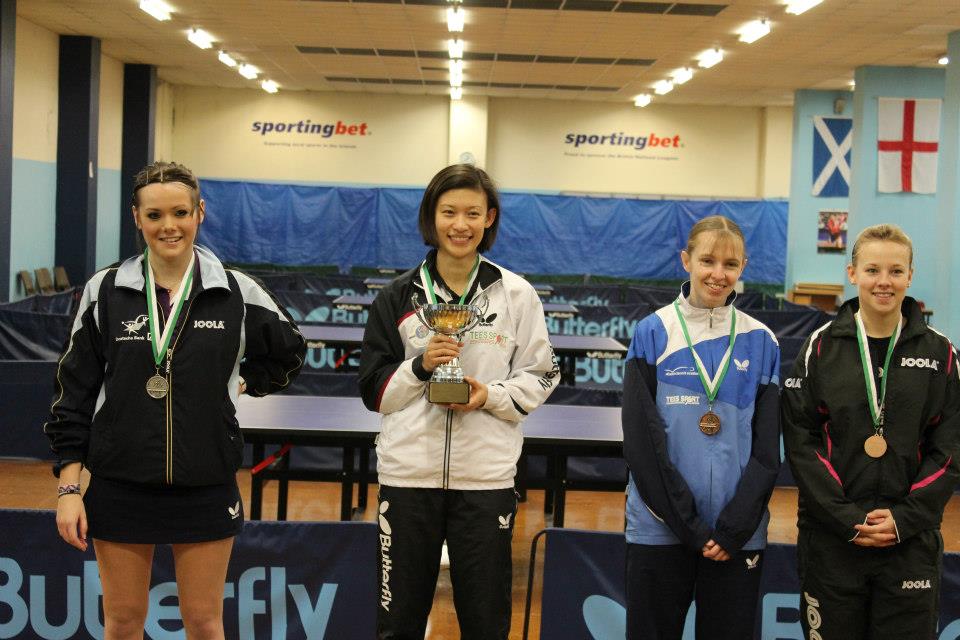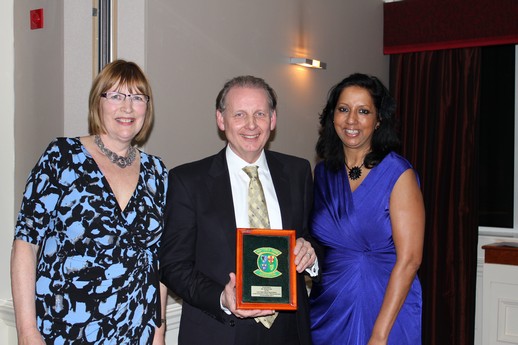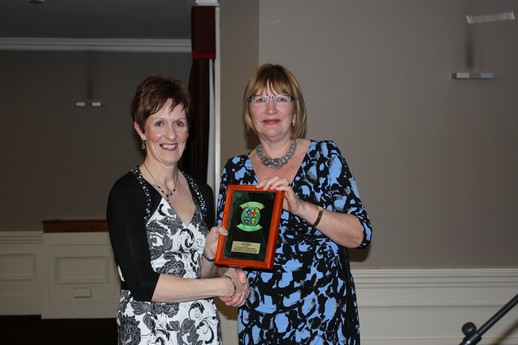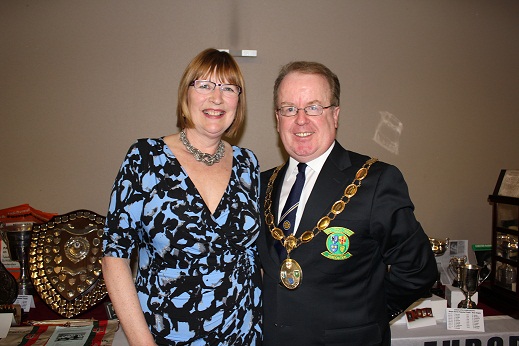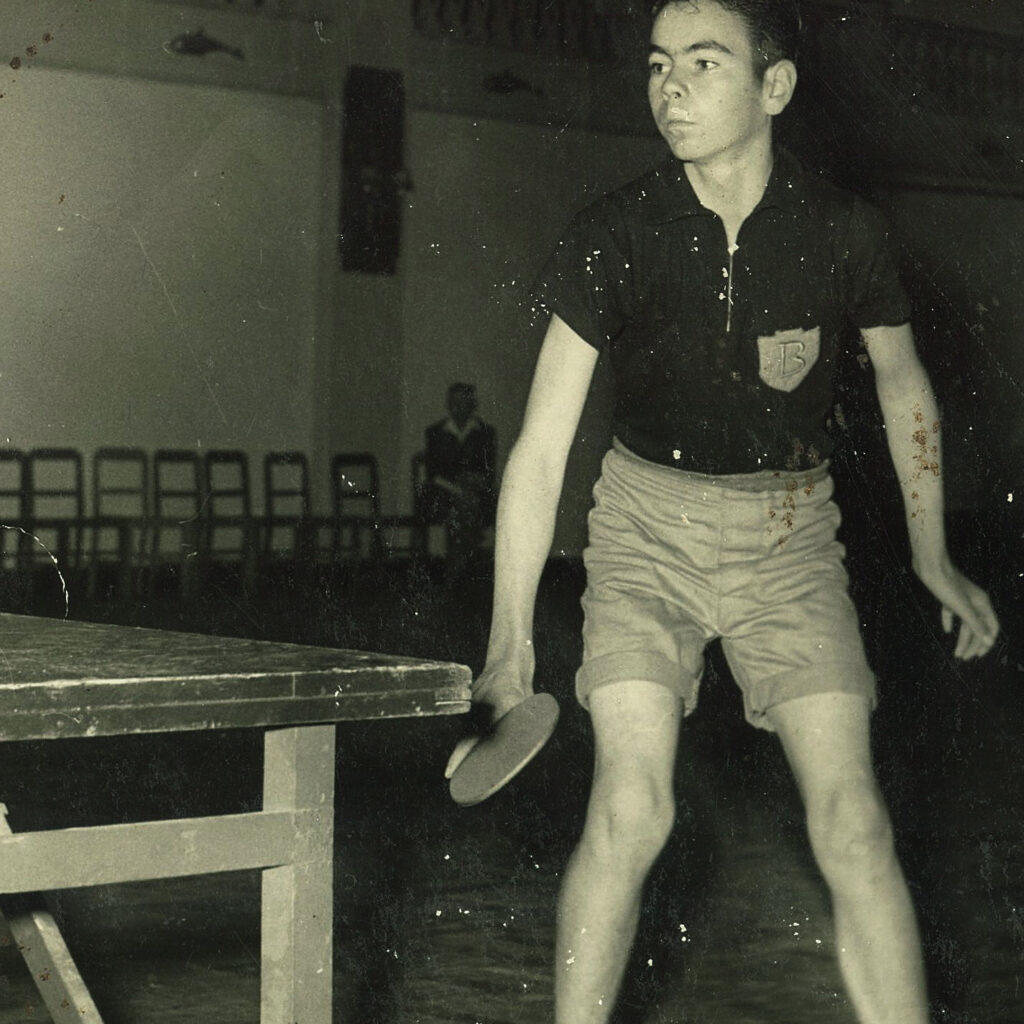The 75th Anniversary of the Irish Table Tennis Association was celebrated at a dinner on Saturday 3rd November, 2012 and our President, Joseph Hickey, delivered a presentation focussed on our history, having earlier in the evening referred to people who had died in a toast to ‘Absent Friends’. Other reports and photographs will appear later.
In Picture: Mrs Pat Hunter, Chair and Mr Joseph Hickey, President, ITTA
Good evening honoured guests, ladies and gentlemen.
Some weeks ago, when I agreed to speak this evening, I was quite content about the idea of delivering a 15-minute speech on the 75-year history of the Association. However, as the weeks went by and I started to gather information, I realised what a difficult task I was undertaking.
In talking and listening to people like Joe Veselsky, Alex Thackaberry, Ken Strong, Tony Martin and former international Don Mahony, I had my eyes opened to a wealth of information on the history of Irish Table Tennis.
Over our 75 years about 80 men and 50 ladies have played for Ireland at senior international level. How could I properly represent great names of the past like Harry Thuillier, Victor Mercer, Harry O’Prey, Ernie Allen, Sean Clerkin, Deirdre Fearon and Joy Geary.
Then there are the more recent stars like Kevin Keane, Kyra Stewart, Jennifer Reid Thompson, Tara Fusco, Jing Yi and Andrew Dennison.
And where do you place the magnificent Karen Senior Walker or Anne Leonard?
And then you have current stars like Liu Na who competed at the London Olympics and John Murphy, already a 5-time winner of the Irish Men’s Singles and still competing at the highest level?
There are also the people who have served the Association as an administrator, coach or umpire, be it at National, Branch, League or Club level.
On the Chain of Office there are the names of 15 people who have served before me as the President of this Association. Most, if not all of them, served previously as our National Chairman, or Secretary, or Treasurer, and on their Provincial Branches.
You also have people like Jim Marsh, Tommy Rowesome, Pat Conneely, Anna Kelly, John O’Donoghue, Ted Mahaffy, Joe Finnegan, Kiron Choudhury, Tom Mitchell, Vinnie O’Neill, OIiver Adamson and many others, too numerous to mention, who have given so much of their time and energy to our sport.
And finally, you have people like Liam O’Ceallaigh, Vivienne Barry, Alan Strong, Arnold Morgan, Louise Long, Arthur Brett, Richard Butler, and Brian Finn who have served, and continue to serve, the Association at National or Provincial level.
In addition, there are many others not here this evening, working away throughout the country at Branch, League or Club level.
Regretfully, I concluded that if I were to give the speech I would like to give, I would need probably an hour and even then I would have to leave out people.
Fortunately, the list of senior internationals, Non-Playing Captains and Presidents is recorded for posterity on the magnificent Swaythling Club trophy produced and presented by Pat O’Brien. Many of you were here for the unveiling of this trophy last year, but, if you have not yet had an opportunity to look at it, and indeed the selection of other material on the tables, you should certainly do so.
Turning back then to the task on hand. You know that 2012 is the 75th Anniversary of the decision to establish a 32-county Irish Association.
However, I very quickly realised that 2012 represents several more anniversaries. It is also the 90th anniversary, it is the 60th, it is the 55th, the 45th, the 40th, the 35th, the 20th, and the 5th and, finally, 2012 is a special year for other reasons.
The first anniversary we are celebrating today is the 90th anniversary of the foundation of the respective Associations in what was then called the Irish Free State and Northern Ireland. Back in 1922, this island was a much-troubled place but it is perhaps a measure of how life continues in almost all circumstances, that the establishment and continuation of table tennis was a matter of some importance.
15 years later, due mainly to the efforts of Cyril Boden who was the Secretary of the Free State Association and his counterpart in the North, Norman Wilson, a meeting was held in Dundalk attended by the 2 secretaries and Messrs. Kemp, Leadbetter, Neeson, Drum and Greer.
The first international match of the combined 32-county team was against England some months later.
Norman Wilson who had only been appointed Secretary of the Northern Ireland Association was obviously an exceptional individual as, in addition to his great work in Ulster, he later became Secretary of the Association and served as our President for 12 years from 1955 until 1967
Cyril Boden was also recognised as an outstanding figure, as he followed Norman Wilson as our President and served until 1971. Cyril Boden continued to be involved in table tennis and when I became Treasurer of the Leinster Branch in 1980, Cyril Boden was one of 2 honorary auditors and I had the pleasure of meeting him. I found him to be an absolute gentlemen but, modest man that he was, I had no idea I was meeting with one of the Founders of the Irish Association.
Turning back now to anniversaries, 2012 is the 60th anniversary of an important milestone. 1952 saw the reigning World Champion win the Irish Open. That man was of course Johnny Leach who won the World Singles title in 1949 and 1951. Our guest this evening Richard Yule tells me that he will be attending Johnny’s 90th birthday shortly and Richard, you might pass on our birthday wishes from his many admirers here in Ireland.
Next we turn to the 55th anniversary. 1957 saw a 14-year-old boy turn up at the Irish Close Championships. By the time the tournament was over, he had won the Boys’ Singles, the Men’s Singles and the Men’s and Mixed Doubles. The boy in question was of course, Tommy Caffrey, who, in the intervening years, has graced our game with his wonderful play and sportsmanship. Earlier this week, an article appeared on the ITTA website describing Tommy’s memories of his time in table tennis and I would encourage all of you to read it. Tommy you are quite simply a legend and I would ask people to show their appreciation.
2012 is also the 45th Anniversary of the founding of the Swaythling Club of which our own Joe Veselsky and the aforementioned Johnny Leach are the surviving honorary Presidents. Other distinguished names to share this honour include Victor Barna.
Of course no history of the Irish Association would be complete without a reference to Joe Veselsky. A profile on Joe was published earlier this year and is a fascinating history in itself.
Joe was formerly the captain of the Slovak team which won the Europe Cup in 1947 and captain of the Czeckosvakian team which won the World Championships.
He came to Ireland in 1949, became a successful business man, played with Sean Clerkin and Don Mahony in the Premier Division of the Leinster League with the all conquering Anglesea team and became NPC of the Irish team. Throughout the 50s, 60s and 70s Joe was responsible for persuading many foreign teams to come to play in Ireland in either the Irish Open or exhibition matches.
Most of this is known to people. However, I would like to share with you a secret about Joe that was deliberately not revealed in his profile because Joe would not have allowed it. About 25 years ago a person from Leinster was elected as Secretary of the Irish Association. However, this election disturbed the informal sharing of National posts which had been in place for many years.
Before it even became an issue, Joe took the matter into his own hands and resigned as President of our Association. This story was told some years after the event by Eddie Limberg who was a major figure in Ulster and Irish table tennis and succeeded Joe as our President.
Joe, for this personal sacrifice, and indeed your wonderful contribution to our sport, I want to say a big thank you and ask everyone to show their appreciation.
1977 is the 35th anniversary of the first Irish team to play in the European Club Championships. That team was Dublin’s Pioneer Club and I am delighted to see that my team mates Pat O’Brien, Michael Rice, Eamonn O’Donoghue and the captain, Tony Martin, are with us this evening.
The aforementioned Tony Martin has served as an official with the Leinster League, the Leinster Branch and the National body for over 40 years. During that time he served as the National Secretary for over 20 years. Tony will be honoured later this evening for his work as a Tournament Referee.
A second, Tony, Tony Phillips, will also be honoured for his work as a tournament Referee. Tony has been a huge figure in Ulster table tennis for many years and was awarded an MBE by the Queen for his services to sport in 2010. That says it all.
These presentations will be presided over by Ken Strong who has also provided magnificent service to this Association for 40 or so years between his work on the Ulster Branch and as our Chairman, National Secretary and more recently as International Director.
Ladies and Gentlemen, taken together, the 2 Tonys and Ken have served this Association collectively for about 120 years and I would ask you to show your appreciation for their extraordinary contribution.
20 years ago Ireland hosted the World Veterans here in Dublin. What a massive undertaking that turned out to be. The main organising Committee consisted of 3 people. Joe Veselsky, whose stature in the game was an important ingredient in getting the event for Ireland, Ray O’Connell, who sadly passed away some years ago was responsible for finance, and our Deputy Life President Alex Thackaberry was involved in almost everything else. Thankfully the event was a great success but the people who were involved have some great stories about the work it required.
Alex, for your work on the World Veterans and the 40 or so years of service you have given the Leinster Branch and the Irish Association as Treasurer, Chairman, President and now Deputy Life President, I want to say a big thank you to both you and Kitty for your contribution to our sport and invite everyone to show their appreciation.
The World Veterans has been a happy hunting ground for Ireland over the last 10 years with Bert Levinge winning gold medals in singles and doubles in the over 70s and over-80s categories.
Speaking of Veterans, Teresa Devaney is deserving of recognition for her great results in recent years in Ireland and the UK.
Going back to anniversaries, 2012 is the 5th anniversary of Colum Slevin winning the Gold medal at the European Over-40s Singles Championships, which was followed a year later by a World Bronze.
Colum of course has been our most successful Irish player over the last 25 years winning national and international medals including 2 European Club Championships. Colum is playing table tennis in Germany this weekend but we are pleased that his wife Birgit is here with is. We have all watched Colum throughout his extraordinary career so I need say no more.
There is one more name I have to mention from our history. Most of us can close our eyes and picture in our minds the legendary Jim Langan. His record in international competition was superb. His record in home tournaments was absolutely extraordinary and, at his peak, only Tommy Caffrey managed wins against him. Jim unfortunately died far too young but his achievements as a player will be remembered and cherished for many years in to the future.
I would now like to make a few remarks about the future of Irish Table Tennis. Names already making their mark playing the game include Paul McCreery, Ashley Givan, Hannah Lynch Dawson, Katie and Elayna McGlone, and Kate Whelan. Off the table, younger volunteers are becoming involved with 20-year-old Jamie McConkey already on the Board.
In recent years, efforts have been made to expand the numbers playing the game at underage level with the introduction of Challenger events and sponsored tables and coaching. Last year the Association supported 40 different projects and so far this season, it has supported 28 projects in 16 schools and 12 clubs.
This work, and indeed many other activities, is all managed, with the assistance and direction of our Board, by our paid staff of Darren Coombes and Rhona Daly, whose recruitment some years ago has increased our capacity to nurture the game in Ireland.
As a result of these efforts, and the work of our volunteers around the country, Irish teams have achieved gold medal results in the various 6 Nations events and the British league including a first ever Ladies team gold in the 6 Nations by Amanda Mogey and Ashley Givan and 3 of the 4 gold medals available at the British Primary Schools Championships, which also featured teams from England, Scotland, Wales, the Channel Islands and the Isle of Man.
Hopefully many of these players will go on to greater things and when someone else gives this speech at the 100th Anniversary, it will be full of their great deeds.
2012 also saw a breech of what is sometimes referred to in the corporate world as the glass ceiling, with the election of Mrs Pat Hunter as our Chair, the first woman ever to hold this office. Pat, you bring with you to this post, many years of experience in Ulster table tennis and business and I wish you every success in the years ahead.
Finally, as I look around the room, I see some of my old opponents like Alistair Cairns, Derek Weir, Tom Heasley and Gerry Greene. They are a reminder to me that table tennis is a sport where players of all abilities have the joy of victory and the disappointment of defeat. Through our shared passion for table tennis, we all learn the importance of Kipling’s poem about meeting with triumph and disaster, and treating those two imposters just the same.
But table tennis has given us even more that. Many people have met their wives, husbands, partners or friends through their involvement in table tennis. If you look beside you or around the room, you will see people who are perhaps teammates or former teammates, fellow competitors, or fellow umpires or administrators. You will see people whom you know. People with whom you have a shared history.
When you put all of these shared histories together, and you add in the histories of our absent friends, you have, ladies and gentlemen, the history of the Irish Table Tennis Association.
JH
President
Irish Table Tennis Association
3rd November, 2012

